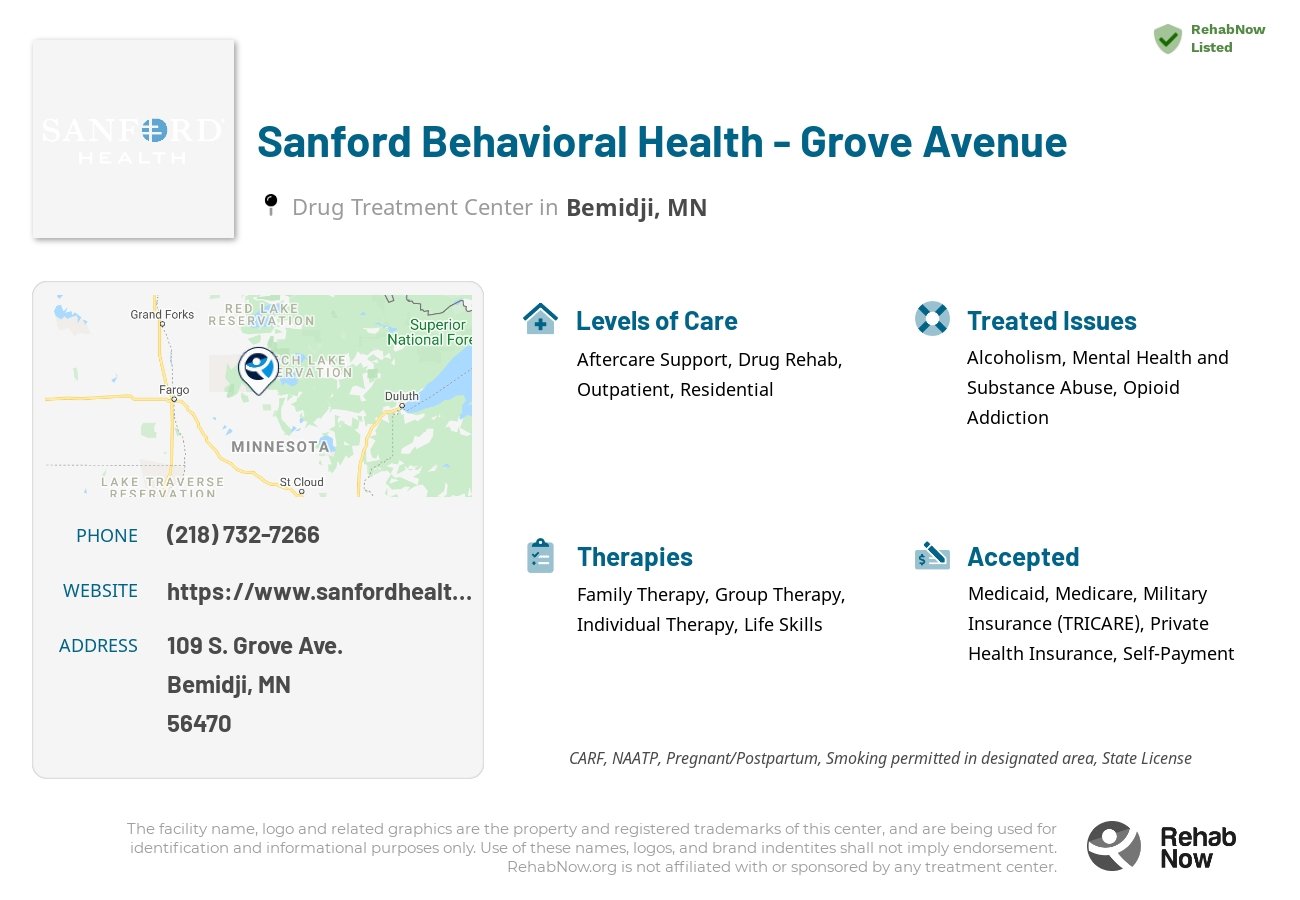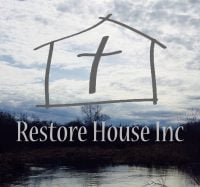Sanford Behavioral Health - Grove Avenue
Drug Rehab Center in Bemidji, Minnesota
Sanford Behavioral Health - Grove Avenue is an accredited facility in Bemidji, Minnesota that provides a range of specialized treatment and counseling services to help individuals with behavioral health issues such as addiction, depression, and anxiety, offering inpatient and outpatient programs tailored to each client's unique needs.
About
Sanford Behavioral Health – Grove Avenue is a Bemidji, Minnesota facility offering a wide range of specialized treatment and counseling services to help adults, adolescents and children manage and cope with behavioral health issues like depression, anxiety, addiction and substance abuse. This facility offers an inpatient addiction treatment program that provides group and individual therapy, crisis management, medication management, and family therapy services. The center also offers outpatient programs such as day and evening programs, family therapy, intensive outpatient, aftercare, and many other services tailored to the individual needs of their clients.
Sanford Behavioral Health – Grove Avenue provides comprehensive addiction and substance abuse treatment, focusing on the underlying causes of clients' addictions. They help their clients address the physical, emotional, and spiritual effects of addiction and work towards building a lifestyle known as “recovery”. Treatment services typically include individual and group therapy, as well as educational lectures and psycho-social activities designed to build skills and help individuals learn how to cope with triggers in their environment. Group therapy sessions focus on topics like positive decision-making, stress management, relapse prevention, and healthy communication.
Sanford Behavioral Health – Grove Avenue is accredited by The Joint Commission and has a variety of awards and recognitions, such as “Excellence in Mental Health Care”, “Excellence in Addiction Services”, and “Achieving Excellence in Substance Abuse Treatment”. The center also offers financial assistance, allowing patients to receive the care they need, regardless of their ability to pay. In addition, the facility has specialized programs designed to meet the needs of pregnant and postpartum women, adolescents and adults, making them a comprehensive, comprehensive treatment option for addiction and substance abuse in the Bemidji, Minnesota area.
Genders
Ages
Modality
Additional
Conditions and Issues Treated
Within the past decade, opioid addiction has become a nationwide epidemic. The United States hosts one of the world’s highest rates of opioid use or abuse and has one of the highest rates of opioid-related deaths. In the United States, opioid drugs are classified as Schedule II-IV controlled substances due to their highly addictive properties and potential for abuse. These include morphine, opium, heroin, oxycodone, hydrocodone, methadone, and fentanyl. Physicians usually prescribe opioids to help control pain.
Over time, opioid users develop a tolerance for the drugs, which makes it difficult, if not impossible, to function without them. In turn, opioid users often resort to illicit means of obtaining the drugs. These means can include drug dealers, friends, and family members who do not have legitimate prescriptions for the drugs. Opioid addiction can quickly lead to heroin use, especially those seeking more intense highs than prescription opioids offer. Due to the high risk of overdose, heroin users are at a much higher risk for illness and death.
Levels of Care Offered
This center offers a variety of custom treatment tailored to individual recovery. Currently available are Aftercare Support, Drug Rehab, Outpatient, Residential, with additional therapies available as listed below.
An outpatient treatment program is set up to help with alcohol or drug addiction or a co-occurring disorder. The treatment must attend the treatment facility for their therapy and other programs but return home each night. The frequency of mandatory attendance decreases after much of the treatment program is complete. The treatment programs are monitored by the treatment facility and case managers who work for a judge or judge’s office. A treatment program may be performed out of a treatment facility, treatment clinic, or treatment center.
The benefits of outpatient treatment programs are many. One of the most beneficial treatment programs is that it allows treatment for clients who cannot afford or may not be able to attend treatment at a treatment facility, treatment center, or treatment clinic full-time. Another benefit of treatment programs is that they reduce crime rates because treatment allows people to treat their addiction.
Residential treatment programs are those that offer housing and meals in addition to substance abuse treatment. Rehab facilities that offer residential treatment allow patients to focus solely on recovery, in an environment totally separate from their lives. Some rehab centers specialize in short-term residential treatment (a few days to a week or two), while others solely provide treatment on a long-term basis (several weeks to months). Some offer both, and tailor treatment to the patient’s individual requirements.
Recovering drug addicts need aftercare support when they leave treatment. The support can include guidance through 12-step programs, outpatient rehabilitation programs, and support groups. Aftercare supports the individual in their desire to maintain sobriety by reducing relapse risk with positive choices.
The success of drug treatment does not end when the addict leaves the rehabilitation center. There is no such thing as a “one and done” type of rehabilitation process. Recovery is a lifelong journey that begins with treatment and continues by the addict committing to outside support groups or drug rehab programs.
When choosing a program, it is crucial to choose one that will provide long-term aftercare support. This ensures that you have the tools you need to sustain your recovery.
Therapies & Programs
Individualized Treatment is essential because it gives addicts the ability to participate in a program that meets their unique needs. An addict should work with professionals who understand what they’re going through, especially if the addict is actively using. Finding the right treatment program for an addict is difficult, but it’s even harder without communicating with those who have experience treating your specific situation.
The therapies typically involve all family members, potentially including siblings, children, and parents who play a role in their daily lives. These sessions can be essential because they address past issues that may have affected an addict or alcoholic’s recovery process. They provide support during this time when it is needed most!
A family therapy session, often called a family meeting or intervention, is a necessary process that helps loved ones of addicts see their situation in a new light. It’s also one of the most challenging things families will ever have to do when they’re facing a loved one battling addiction or alcoholism.
Group therapy sessions provide recovering addicts with a chance to cope with everyday situations that many face. Group therapy sessions are held in rehab facilities, clinics, churches or community centers that offer drug addiction treatment.
People who attend these groups are encouraged to voice their feelings and support other addicts in recovery. This helps group members strengthen their own recovery program while cheering on others who are struggling with sobriety.
Life skills training is beneficial for addicts in recovery because it helps them learn how to take care of themselves and improve their quality of life, which can promote feelings of purpose and motivation.
This works by teaching individuals life-enhancing skills that support positive living, including:
- Healthy lifestyle habits
- Skills to effectively manage stress
- Effective communication skills to help them get their needs met without turning to drugs or alcohol
- Money management and budgeting skills so they can continue to take care of themselves after treatment ends.
Payment Options Accepted
For specific insurance or payment methods please contact us.
Is your insurance accepted?
Ask an expert, call (888) 674-0062
Sanford Behavioral Health Associated Centers
Discover treatment facilities under the same provider.
- Sanford Thief River Falls Behavioral Health Clinic in Thief River Falls, MN
- Sanford Hospital - Outpatient Program in Luverne, MN
- Sanford Behavioral Health Headwaters ACT in Bemidji, MN
- Pathfinder Childrens Treatment Center in Thief River Falls, MN
Learn More About Sanford Behavioral Health Centers
Additional Details
Specifics, location, and helpful extra information.
Bemidji, Minnesota 56470 Phone Number(218) 732-7266 Meta DetailsUpdated November 25, 2023
Staff Verified
Patient Reviews
There are no reviews yet. Be the first one to write one.
Bemidji, Minnesota Addiction Information
Minnesota is fighting an opioid epidemic that is leaving hundreds of its residents dead each year. Both prescription opioids and illicit opioids are widely abused in the Land of 10,000 Lakes. Heroin continues to be one of the most commonly abused drugs in the state, if not the most common illicit drug. Over 10% of all treatment admissions in Minnesota list heroin as their drug of choice.
In Bemidji, Minnesota, 15,000 people abuse or are addicted to drugs each year. The most commonly abused drugs in the state are alcohol, marijuana, prescription opioids, and methamphetamines. Drug-related emergency room visits increased 114% from 2005 to 2013. The majority of people who die from overdoses are aged 35-54. There are many sober living options in Bemidji, MN, so you can find one that fits your needs.
Treatment in Nearby Cities
- Monticello, MN (127.0 mi.)
- Hastings, MN (184.2 mi.)
- Morris, MN (100.9 mi.)
- Big Lake, MN (126.7 mi.)
- Duluth, MN (139.9 mi.)
Centers near Sanford Behavioral Health - Grove Avenue
The facility name, logo and brand are the property and registered trademarks of Sanford Behavioral Health - Grove Avenue, and are being used for identification and informational purposes only. Use of these names, logos and brands shall not imply endorsement. RehabNow.org is not affiliated with or sponsored by Sanford Behavioral Health - Grove Avenue.








